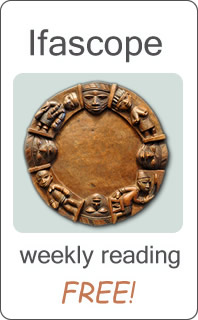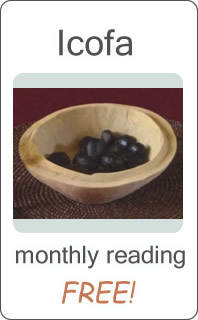How you look at something determines what you see...
As a small boy I was always fascinated with the story of the six blind men encountering an elephant for the first time. Each man, seizing on the single feature of the animal, which they touched first, and being incapable of seeing it whole, loudly maintained his limited opinion on the nature of the beast. The elephant was variously like a wall, a spear, a snake, a tree, a fan or a rope, depending on whether the blind men had first grasped the creature's side, tusk, trunk, knee, ear or tail. Each was blinded not so much by their lack of sight, as by their lack understanding.
More than a quarter of a century has passed since I first happened upon the majesty and power of Orisa. Yet, I am struck, more than ever, by the intellectual blindness of those encountering, and involved, in this philosophy. This, at worst blindness, and at best, astigmatic view of Ifa, causes them to incorrectly identify the various parts in much the same way the six blind men described the elephant. And their faulty intellectual vision comes from bringing the dogma and rigidity of Western Religious vision to their view. Having been raised in a society that separated religion from temporal life; a society where man was seen in a never-ending struggle with his inherently flawed character and the enticements of an implacable devil (small "d" intentional); a society where his only salvation could come from slavishly following an impossible set of rules determined by a Paternalistic god, you can begin to see how their view of Ifa is affected
Certainly, all sensible orisa devotees would agree that the militant behavior of the Christian Missionaries was unacceptable. Yet, many of these same individuals fail to see that their own view of the power and majesty of the orisa is flawed with much of the same thinking that allowed these "soldiers of god" to identify Esu as the devil.
They look at the energy of the orisa, and rather than seeing the beauty, power and natural order that the Yoruba saw thousands of years ago, they seek to transform the orisa into twisted and mutated versions of their Christian paradigm! Instead of Wisdom, they desire "rules." And the majority of these, including recent Odu interpretations are simply paraphrases of Christian litany.
Indeed, their whole emphasis on Odu is to shift the living, adaptive energy of Odu into the fixed "Word" of their Christian world. Christians believe that the "word" is absolute, a representation of God's message, that it is unalterable, not open for interpretation and inviolable. Ifa wise men and women understood that Odu was the living energy of the moment, and kept it that way by seeing to it that Ifa was an oral, not written, tradition. In that way, subtle changes, interpretations and contextual observations would continue to impact the triangulation between Diviner, Client and Orunmila.
Rather than use the Wisdom to empower themselves, they have sought to replicate, in African dress, the worst parts of their philosophy. They perceive you as helpless, adrift in a chaotic world, where only the Babalawo or Priest can save you. And more often than not, they want the power (as opposed to the wisdom) to be that Priest or Babalawo. They want the same secrecy and subservience in Orisa that they had in their Churches. They want the same non-sensical, irrational morality regarding gender, sexual orientation, color and nationality to become part of a philosophy that always rejected these attitudes.
And, when faced with the facts, they attack the messenger instead of the message. Well, they have a long history of slandering, killing and torturing those who disagreed. Galileo was just one of thousands. Yet, the earth continued to revolve around the sun despite their insistence. Like the blind men running their hands over the elephant, they insist on describing, defining and twisting the reality and beauty of Orisa into their own limited view.
Ifa is about empowerment, diversity, truth, wisdom, knowledge, character, personal growth and a lack of fear. If you want to experience it, you must view it with a fresh and open perspective.the freshness and openness that the ancient Yoruba wise men and women used to accurately see the world not as a punishment, but as a joyous place for those who live here. A world where a benevolent God gave us all the tools to reach happiness, fulfillment and our Destiny.
Blessings,
Oluwo Philip Neimark
p.s. My dear friend and Ifa Priest, Fajuitan, sent me the following profound comment on the above piece after I had sent it to him for posting on the Foundation site. It is the personal growth, wisdom and character of initiating individuals like Fajuitan that make our task worthwhile.
"I really like the story of the blind men and the elephant. It makes me ponder that even if we were able to see the elephant, we wouldn't understand, ...how could we understand at face value, we may realize that it is an elephant but not "who" the elephant "is". Only by experiencing the "elephant experience" may we began to understand".
Click here to return to classroom




